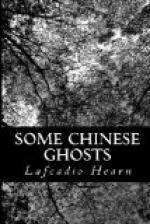Then Pu bade those who aided him that they should feed the furnace well with wood of tcha; but he told his resolve unto none. Yet after the oven began to glow, and he saw the work of his hands blossoming and blushing in the heat, he bowed himself before the Spirit of Flame, and murmured: “O thou Spirit and Master of Fire, I know the truth of thy words! I know that a Soul may never be divided! Therefore my life for the life of my work!—my soul for the soul of my Vase!”
And for nine days and for eight nights the furnaces were fed unceasingly with wood of tcha; for nine days and for eight nights men watched the wondrous vase crystallizing into being, rose-lighted by the breath of the flame. Now upon the coming of the ninth night, Pu bade all his weary comrades retire to, rest, for that the work was well-nigh done, and the success assured. “If you find me not here at sunrise,” he said, “fear not to take forth the vase; for I know that the task will have been accomplished according to the command of the August.” So they departed.
But in that same ninth night Pu entered the flame, and yielded up his ghost in the embrace of the Spirit of the Furnace, giving his life for the life of his work,—his soul for the soul of his Vase.
And when the workmen came upon the tenth morning to take forth the porcelain marvel, even the bones of Pu had ceased to be; but lo! the Vase lived as they looked upon it: seeming to be flesh moved by the utterance of a Word, creeping to the titillation of a Thought. And whenever tapped by the finger it uttered a voice and a name,—the voice of its maker, the name of its creator: PU.
* * * * *
And the son of Heaven, hearing of these things, and viewing the miracle of the vase, said unto those about him: “Verily, the Impossible hath been wrought by the strength of faith, by the force of obedience! Yet never was it our desire that so cruel a sacrifice should have been; we sought only to know whether the skill of the matchless artificer came from the Divinities or from the Demons,—from heaven or from hell. Now, indeed, we discern that Pu hath taken his place among the gods.” And the Emperor mourned exceedingly for his faithful servant. But he ordained that godlike honors should be paid unto the spirit of the marvellous artist, and that his memory should be revered forevermore, and that fair statues of him should be set up in all the cities of the Celestial Empire, and above all the toiling of the potteries, that the multitude of workers might unceasingly call upon his name and invoke his benediction upon their labors.
[Illustration: Chinese calligraphy]
NOTES
“The Soul of the Great Bell.”—The story of Ko-Ngai is one of the collection entitled Pe-Hiao-Tou-Choue, or “A Hundred Examples of Filial Piety.” It is very simply told by the Chinese narrator. The scholarly French consul, P. Dabry de Thiersant, translated and published in 1877 a portion of the book, including the legend of the Bell. His translation is enriched with a number of Chinese drawings; and there is a quaint little picture of Ko-Ngai leaping into the molten metal.




